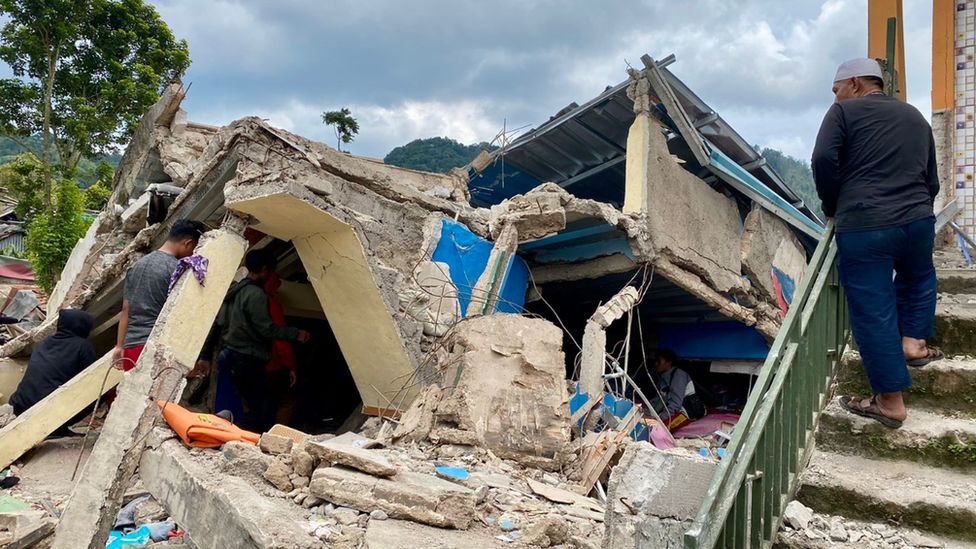Indonesia earthquake: Search for survivors as death toll soars
- Published

Rescuers in Indonesia have continued their efforts to find survivors trapped after Monday's earthquake in West Java.
The latest official figures say 271 people were killed - many of them children - and are 40 still missing. Hundreds of others were injured.
Damaged roads and the vast size of the affected area are making it difficult to locate and help victims.
Aprizal Mulyadi was at school when the quake hit, and was trapped after "the room collapsed".
The 14-year-old said his "legs were buried under the rubble", but he was pulled to safety by his friend Zulfikar, who later died after himself becoming trapped.
The National Disaster Mitigation Agency said on Tuesday that 22,000 houses had been damaged, and that more than 58,000 people had taken shelter in several locations in the region.
The 5.6 magnitude quake struck a mountainous region the previous day, causing landslides that buried entire villages near the West Java town of Cianjur.
Victims were crushed or trapped after walls and roofs caved in. "It all happened so fast," Aprizal told AFP news agency.
A representative of the National Search and Rescue Agency also confirmed that many of the dead were young people.
"Most of the casualties are children because at 1pm, they were still at school," said Henri Alfiandi.
The earthquake, which struck at a shallow depth of 10km (six miles), was followed by dozens of aftershocks which caused more damage as poorly built homes collapsed.
In the village of Cibereum, a family was trying to retrieve the body of their eldest son - a 28-year-old man who had been crushed when the other levels of the home fell on him.
Rescuers struggled to sift the rubble.
"We have to dig through the concrete of the second floor that crushed the victim. But we have seen the body," a military official, Sergeant Payakun told the BBC.
Cucu, a 48-year-old resident, told the Reuters news agency that she survived after being crushed beneath a child.
"Two of my kids survived, I dug them up ... Two others I brought here, and one is still missing," she said through tears.
"Many bodies are lying in the hospital grounds, it's very crowded," said her relative, Hesti.
In one area, victims held cardboard signs asking for food and shelter.
President Joko Widodo visited the remote disaster zone on Tuesday where he was pictured with responders.
"My instruction is to prioritise evacuating victims that are still trapped under rubble," he said.
Hundreds of police and other rescuers are taking part in the rescue effort. Mr Jokowi pledged compensation to affected communities.
Save the Children said that at least 80 schools had been damaged.
"Children are terrified and we need to get food, water and shelter to them and ensure they're not at risk of separation from parents and caregivers," a spokesperson said.
Earthquakes are common in Indonesia, which sits on the "ring of fire" area of tectonic activity in the Pacific.
The country has a history of devastating tremors and tsunamis, with more than 2,000 people killed in a 2018 earthquake on the island of Sulawesi.
Have you been affected by the issues raised in this story? Share your experiences by emailing haveyoursay@bbc.co.uk.
Please include a contact number if you are willing to speak to a BBC journalist. You can also get in touch in the following ways:
- WhatsApp: +44 7756 165803
- Tweet: @BBC_HaveYourSay
- Upload pictures or video
- Please read our terms & conditions and privacy policy
If you are reading this page and can't see the form you will need to visit the mobile version of the BBC website to submit your question or comment or you can email us at HaveYourSay@bbc.co.uk. Please include your name, age and location with any submission.
Related Topics
- Published22 November 2022
- Published21 November 2022